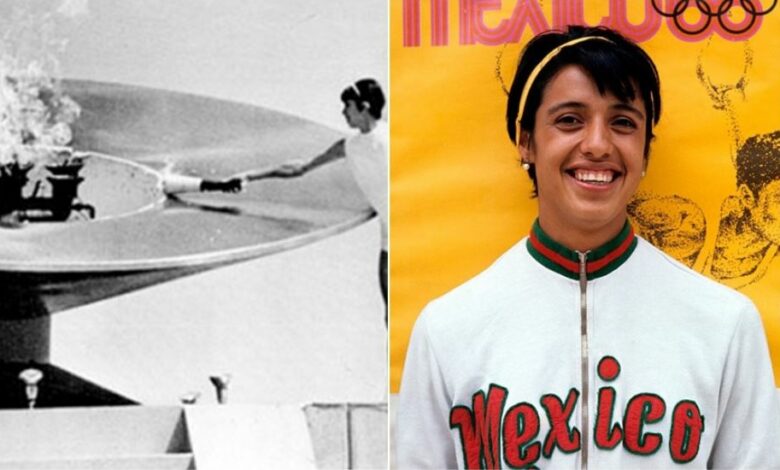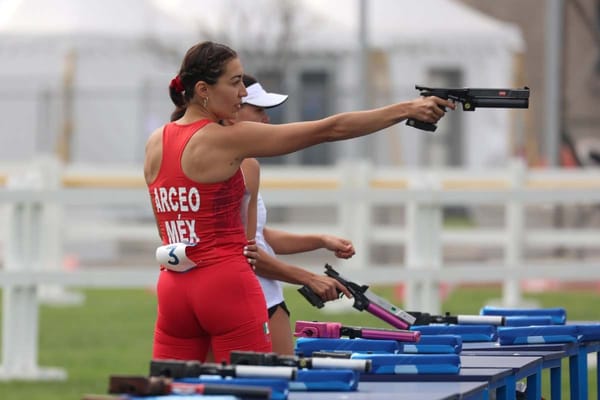Asteroid named after Enriqueta Basilio, the first woman to light Olympic cauldron
"I not only lit the fire, but I also lit the hearts of women": Enriqueta Basilio. Mexican athlete Enriqueta Basilio, carried the Olympic flame to the cauldron during the Mexico '68 Olympic Games.

The distinguished Mexican athlete, Enriqueta "Queta" Basilio, will now transcend the sidereal infinite. To pay tribute to her, the International Astronomical Union named one of the eight Trojan asteroids orbiting Jupiter "Queta". The other seven were also named after Olympic and Paralympic athletes who have left their mark.
Let's remember that Enriqueta Basilio became the first woman in history to light the cauldron with the Olympic flame at the Mexico '68 Olympic Games. The tribute is intended as international recognition, noted the Astronomical Union, to this Mexican woman for her contribution to the search for equality between women and men athletes.
The first woman to light the Olympic flame
It was the first time that a woman carried the torch with the Olympic fire in the final stage of the course, to place it in the cauldron and signal the official start of the sporting event. The games were inaugurated in the Olympic University Stadium, in a country shaken by the continuous repression of young people that culminated, 10 days earlier, in the massacre at the Plaza de las Tres Culturas in Tlatelolco.
The task of lighting the Olympic flame was entrusted to the Baja California athlete Enriqueta Basilio Sotelo, who completed the last relay and climbed a long staircase. Her goal was to reach the cauldron and light it. It was her goal in life, she says because in that year 1968 the Western world was also in the throes of a women's rights movement.
With determination and elegance, she ascended the 90 steps, greeted the world from the four corners of the world, and performed the ritual act.
"I not only lit the Olympic fire, but I also lit the hearts of women," she said five decades after entering Olympic history, on her return to UNAM, sitting at the foot of the cauldron that marked her forever. "I had that privilege as a woman, as a representative of Mexican women, as the woman of the world," she says as she turns to look at the stands of the stadium as if she still hears the applause of the people. "From then on there were many changes in the fight for our rights, for justice, for equality, for solidarity, and all the values that respect for a woman represents."
On her tour there came a moment when she didn't hear the roar of the crowd, she just concentrated on climbing the stairs and lighting the flame. "My parents were at the entrance. My mom, very nervous, I don't think she saw me because she was praying the rosary. My sister was taking pictures," she recounts. "My biggest responsibility was to climb the ladder. I remember my companions, the President's greeting, the 200-meter turn where I was blocked by the athletes who were taking pictures. The boy scouts opened the way for me a few meters before climbing the ladder and I accomplished my mission."
And she basks in the memories: "When I put my foot on the first step I was completely blocked. My concentration was total, I didn't hear any noise or see the people who were so close to me, on the sides. It was extraordinary, but I could not understand what I was doing there. Afterward, you realize when you travel around the world and someone recognizes you. It's wonderful". Enriqueta Basilio assures that there were also other meanings in the fact that a woman lit the Olympic fire: "The fight for justice, for solidarity, for not allowing us to continue to be rejected or made less, also in sport". "It was my goal in life. In sport I could not continue for Munich 1972 because of conflicts with the sports authorities," she stresses.
"We didn't hear about it."
A special juncture before the 1968 Olympics was the student movement, which sought changes in Mexico's political structure. Ten days before the inauguration it had been brutally repressed. Enriqueta Basilio, then just another university student in the country, considers that she did what she had to do since she had another responsibility. "I was a student in Mexicali, here I came to train... but we are part of those young people. Our mission and responsibility were to represent Mexico as athletes," she says.
"We fulfilled as Mexicans, as athletes, as young people, because we had to show a different Mexico, it was what we wanted to tell the world, which was not what some people thought," she adds, before recalling how she lived those days before the Games. "We were at the Olympic Committee and they wouldn't let us out. There was no television or telephones. We didn't find out, we were between the National Defense and Military Camp No. 1. It was difficult to find out what was going on in the street. We didn't know until later, because we had no way. They showed us movies and brought us music so we could dance during some recreation time. The instruction was that we were not to leave the Olympic Center or the house, those who lived in Mexico City. Later we learned why," she says.
However, Queta Basilio recalls that many of those students who demonstrated were also part of the Organizing Committee. "The same people who were at the demonstrations, when they finished, came to the Organizing Committee because they collaborated with the organization of the event. There were thousands of kids, men, and women, who knew languages and were registered as members of the committee... It was the first Latin American country to organize an Olympic Games, it was something special." In the studio of architect Pedro Ramírez Vázquez, there is a photo of that significant moment; Enriqueta Basilio wrote this dedication: "For the world, I was born the day I lit the Olympic flame. Thank you, architect".
Sources: Gaceta UNAM




